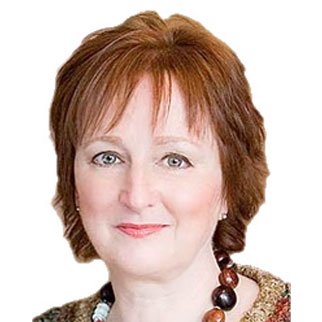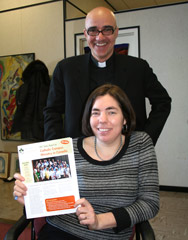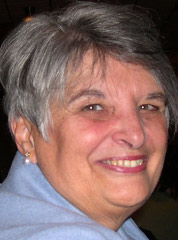
Deborah Gyapong, Canadian Catholic News
Deborah Waters Gyapong has been a journalist and novelist for more than 20 years. She has worked in print, radio and television, including 12 years as a producer for CBC TV's news and current affairs programming. She currently covers religion and politics primarily for Catholic and Evangelical newspapers.
 OTTAWA - The headline speaker at an historic conference March 24-26 in Mississauga, Ont., hopes Personal Ordinariates for Anglicans will flourish in the Catholic Church through an emphasis on mission and unity.
OTTAWA - The headline speaker at an historic conference March 24-26 in Mississauga, Ont., hopes Personal Ordinariates for Anglicans will flourish in the Catholic Church through an emphasis on mission and unity.But Fr. Aidan Nichols, a Dominican priest and scholar who is an expert on Anglican Church history and patrimony, would have preferred the Apostolic Constitution Anglicanorum coetibus had gone further than the Personal Ordinariate structure it calls for and instead created “the Western equivalent of a Catholic Eastern Church.”
“That would have been my preferred option, chiefly because it would be better able to resist assimilation to the parishes of the Latin dioceses,” he said in an e-mail interview. “But if the ecclesial arrangement offered enables the 'patrimony' to be transmitted, that is the main thing.”
Published in
Canada
March 16, 2011
New tool to help pick Catholic education
 OTTAWA - Canadian Catholic Campus Ministry (CCCM) has devised a tool to help guide students in choosing a university where there` can keep their faith alive.
OTTAWA - Canadian Catholic Campus Ministry (CCCM) has devised a tool to help guide students in choosing a university where there` can keep their faith alive.The tool can help students find a school where there is a “vibrant, active student ministry” that will help “nurture their faith” and allow them to “blossom,” said CCCM co-ordinator Lori Neale.
The 2011 Status Report on Catholic Campus Ministry in Canada is the first of a series of status reports on the state of campus ministry across Canada. Neale said CCCM will track the information by doing a similar study in another two or three years.
Published in
Education
 OTTAWA - Scott Braunschweig sometimes wonders if the development work he is doing in Afghanistan is “in some ways very selfish.” After all, he finds it so personally gratifying.
OTTAWA - Scott Braunschweig sometimes wonders if the development work he is doing in Afghanistan is “in some ways very selfish.” After all, he finds it so personally gratifying.Braunschweig works with Catholic Relief Services (CRS), the international development arm of the American bishops. He had worked in many other countries in overseas development previously, but often found it difficult dealing with bureaucracy to get things done. But in Afghanistan, “you get this immediate reward... you can see the physical health of the people improve when you put in a water project.”
Afghanistan had been on Braunschweig’s “no-go” list back in 2004 when he was looking at going overseas again. But despite his concerns about violence and negative perceptions about conflict, an intriguing position with the Tribal Liaison Office lured him there.
Published in
Canada
 OTTAWA - An interfaith coalition is calling for “inspired leadership” from the federal government in addressing poverty in Canada.
OTTAWA - An interfaith coalition is calling for “inspired leadership” from the federal government in addressing poverty in Canada.It also expressed dismay over the Conservative government’s March 7 response to the poverty-elimination plan proposed last November by the Committee on Human Resources, Skills and Social Development and the Status of People with Disabilities (HUMA).
“We were disappointed that the federal government response did not take advantage of the consensus for co-ordinated action reflected in the HUMA report and did not respond substantively to the recommendations,” said the March 8 Interfaith Declaration from the Canadian Council of Churches (which includes Canada’s Catholic bishops), the Canadian Interfaith Delegation — World Religions Summit 2010, the Evangelical Fellowship of Canada and Dignity for All.
Citizens for Public Justice (CPJ) released a more critical statement, saying that its “hope for Ottawa to meaningfully engage in poverty reduction efforts evaporated” when the federal government released its response to the HUMA report.
Published in
Canada
OTTAWA - Three pro-family groups have been granted leave to make a joint intervention in an appeal to a ruling that struck down prohibitions against prostitution, which is to be heard by the Ontario Court of Appeal later this spring.
“We’re very pleased an intervention in support of the dignity of women and of family will be heard in the appeal,” said Catholic Civil Rights League executive director Joanne McGarry.
The league is making a joint-intervention with REAL Women of Canada and the Christian Legal Fellowship. The three groups intervened previously when the Terri Jean Bedford et al. vs. the Attorney General of Canada case went before the Ontario Superior Court last September.
In that ruling, Justice Susan Himel struck down sections of the Criminal Code that prohibited soliciting for the sake of prostitution, running a brothel or pimping.
“We’re very pleased an intervention in support of the dignity of women and of family will be heard in the appeal,” said Catholic Civil Rights League executive director Joanne McGarry.
The league is making a joint-intervention with REAL Women of Canada and the Christian Legal Fellowship. The three groups intervened previously when the Terri Jean Bedford et al. vs. the Attorney General of Canada case went before the Ontario Superior Court last September.
In that ruling, Justice Susan Himel struck down sections of the Criminal Code that prohibited soliciting for the sake of prostitution, running a brothel or pimping.
Published in
Canada
March 16, 2011
Senate urged to quickly pass ‘Medicine for All’ bill
 OTTAWA - Supporters of the “Medicine for All” Bill C-393 hope the bill can pass the Senate before a possible spring election call that would see the bill die.
OTTAWA - Supporters of the “Medicine for All” Bill C-393 hope the bill can pass the Senate before a possible spring election call that would see the bill die.“This is one of those rare moments of life, where you have a precious window of opportunity, you either open it or you don’t,” said Dr. James Orbinski, Dignitas International founder and a University of Toronto public health professor. “Let’s make it happen.”
The bill, which passed the House of Commons March 9, would amend the Access to Medicine Regime and make cheaper generic drugs available to the world’s poor. Opponents are against this as it would infringe upon trademark and other rights held by big pharmaceutical companies.
Published in
Canada

